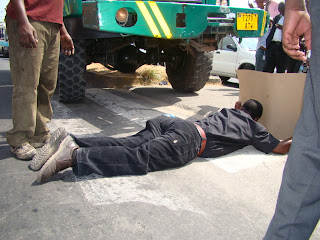“(undecipherable Swahili) wanasharia” came the
response to our cab driver’s inquiry about why traffic had ground to a
standstill. The one word of a sentence I
understand always catches my attention, but this time I was especially
interested: wanasharia means lawyers.
I turned to my companion and
asked with incredulity “the lawyers
are protesting?” He could hardly believe
it either and responded “I don’t think so, I never heard anything about a
protest today”. Our cab driver, lamenting
his misfortune at taking an ill-fated fare, made and abrupt turn into the
shoulder of the road, cutting off a person doing the exact same thing. A few minutes of weaving, heavy braking and intermittent
cursing brought us to the main intersection that was the source of the
blockage.
Approximately thirty people stood
blocking off all corners of the T-intersection.
Many held placards saying something roughly translated as “if the ministers get sick, they go to India”. Surrounding them were the mass of cars,
trucks and bajajes, silenced by the midday anomaly. Relieved of the false urgency that is Dar es
Salaam traffic, passengers and drivers alike migrated towards the protesters –
some to take pictures or record the latest on their i-pads, some to lend
support, others, like our driver, to stage their own protest.
This was an impassioned, though
peaceful protest. One man implored “foreigners,
see what we are doing to our people, Tanzanians, if you care, join us!” Another woman, who I recognized, was having a
heated argument with a commuter demanding that they stop blocking the
intersection. As it turns out, the
protesters were lawyers. A group from several local NGOs had banded
together to block off the main artery in and out of the city’s commercial
centre. They were united by the
increasingly desperate situation in public hospitals in throughout the country
as a result of an ongoing countrywide doctors’ strike. Their message: it is the government’s constitutional
responsibility to protect the people’s right to health”.
Since January 23rd,
patients have been scrambling to procure frontline healthcare and were dealt another
blow this weekend, when specialists who had up until then continued their
services, opted to join the strike, ceding to the increasing strain. This last move was the culmination of a
deterioration of medical services that began with an intern strike over unpaid
arrears late last year at Dar es Salaam's Muhibili National Hospital.
The doctors’ requests are not
new: better pay, improved working conditions and the reinstating of the interns
whose employment was terminated as a consequence of their strike. The government has been engaged in
negotiations with the doctors, but local news reveals that the public perceives
it to be lax in its efforts to resolve the issue. Adding fuel to frustrations is the recent
substantial increase to sitting allowances of MPs (or ‘sleeping allowances’ as
my assistant informed me, in reference to the frequent stream of pictures of
MPs asleep during government sessions). Many, including the opposition, see the raise
as unjustifiable given the state of the country and in the context of the many
other perks associated with government office. The doctors’ strike is just one
of many supporting examples.
The failure to resolve the doctors’
strike is particularly egregious as its consequences can actually mean life or
death, and that is exactly what is happening. Poor Tanzanians with few alternatives are
being denied treatment, including emergency services. Regardless of the politics, their lives hang
in the balance. That was the clarion call of the lawyers this afternoon.
Never am I more exhilarated by my
profession then when I see us speaking up for those without voices. The power of peaceful protest is its ability
for few to make known the plight of the many.
I was heartened by the calmness of the police and military as well as the
general “there’s nothing we can do” sentiment of the crowd regarding the interruption. Above the arguing, singing and exacerbated
honking by frustrated travelers, I recalled something I once read, written by
Arundhati Roy “Another world is in not only possible, she is on her way. On a quiet day, I can hear her breathing.”

No comments:
Post a Comment